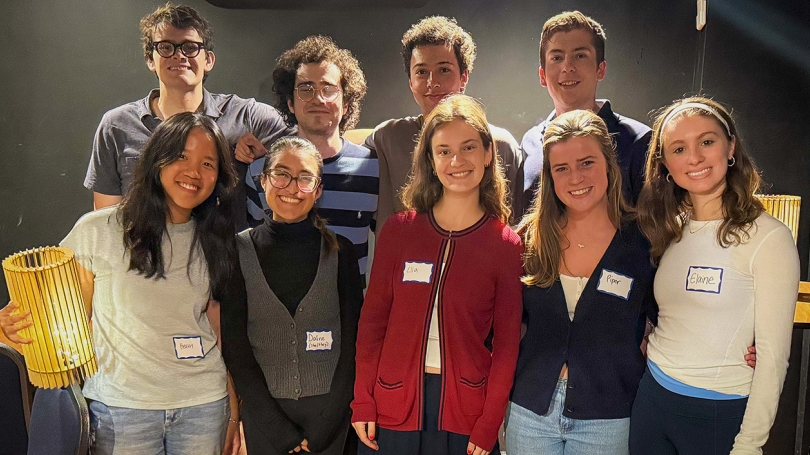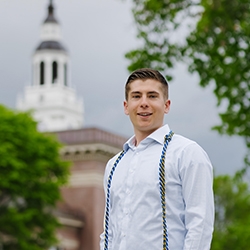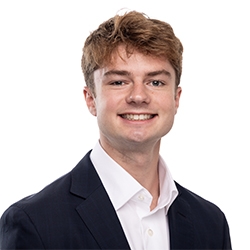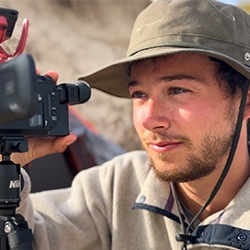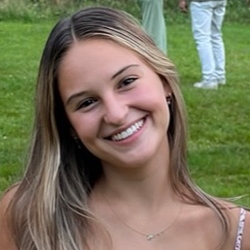The 2024-2025 academic year has been one of growth, discovery, and meaningful collaboration for Dartmouth students and the community at The Arthur L. Irving Institute for Energy and Society. As the year comes to a close, we're proud to celebrate members of the Class of 2025 who have engaged with the Institute through programming, experiential opportunities, and coursework.
Undergraduate experiences at the Institute explore the technical, political, economic, and social dimensions of the global energy landscape. This year's graduating class has traveled on Energy Immersion Trips, utilized Irving Institute Student Grants, and participated in the Energy Justice Clinic. They've also explored energy systems through Bootcamps and TuckLAB: Energy, and taken on leadership roles in the Dartmouth Energy Alliance. Many have completed coursework through the Energy Justice Course and the Environmental Studies Minor: Sustainable Energy Track.
"The Class of 2025 is an outstanding group of students, and it's been a true privilege for all of us at the Irving Institute to work alongside them," said Amanda Graham, Director of Academic Programs. "The close of the academic year always brings a mix of emotions; while it's hard to say goodbye, we're incredibly proud of all they've achieved and excited to see the impact they'll make in the next chapter of their educational or professional journeys."
To honor their accomplishments, our Teaching and Learning team gathered with students on May 13 at Hanover's Sawtooth Kitchen for a celebratory send-off. We also caught up with a few graduating seniors to hear their reflections on their time with the Institute and how it has shaped their academic and professional interests in energy.
Ella Briman
Major: Government
Hometown: Cape Elizabeth, Maine
Q. How have you been involved with the Irving Institute?
A. I've worked in the Energy Justice Clinic, completed the Environmental Justice course, received an internship grant, and the Environmental Studies Minor: Sustainable Energy Track.
Q. Looking back, how has your understanding of energy and energy systems evolved during your time at Dartmouth? Was there a turning point or experience that significantly shaped your perspective?
A. My experience researching energy insecurity in the Upper Valley has opened my eyes to how interconnected energy and climate are with community health. There is no clean energy transition without addressing the unreliable services and assistance for households that are already struggling to make ends meet. Conversations with local community members and service providers have illustrated that the existing system doesn't work for those who are forced to make sacrifices in order to pay for heat and electricity costs. As we progress towards more sustainable energy infrastructure, working with the Energy Justice Clinic has affirmed that rural energy insecurity remains painful for many in the area.
Q. How do you hope to be involved in energy and energy systems, climate, or sustainability in your next steps with education or your career?
A. I hope to continue working and learning about energy systems and particularly how subsidies or programs can be used to uplift communities.
Q. What advice do you have for incoming first-year students?
A. Try as much as you're able to! Apply for programs and grants and clubs even if you're not sure it'll work out or that it's right for you - it might pay off in ways you never expected.
Arne Grette
Major: Economics
Hometown: Issaquah, Washington
Q. How have you been involved with the Irving Institute?
A. I traveled on a Gulf Coast Immersion Trip, served as an Energy Justice Research Assistant, received an Independent Research Grant, and participated in the Electricity Grids and Markets Bootcamp.
Q. Looking back, how has your understanding of energy and energy systems evolved during your time at Dartmouth? Was there a turning point or experience that significantly shaped your perspective?
A. Traveling to the Gulf Coast with the Irving Institute and Dartmouth Sustainability made me realize that the energy industry was filled with curious people navigating fast-moving changes in technology and policy. I credit this trip with sparking my interest in an energy career due to a simple realization: I would never stop learning about energy. While I study energy through an economic lens, it's always amazing to learn from engineers who have a totally different perspective.
Q. How do you hope to be involved in energy and energy systems, climate, or sustainability in your next steps with education or your career?
A. I hope to be involved in navigating wholesale electricity markets and FERC (Federal Energy Regulatory Commission) regulation as the US tries to meet rising electricity demand in an affordable way while also lowering carbon emissions. In September, I'll begin my role as an Analyst for Charles River Associates' energy practice.
Q. What advice do you have for incoming first-year students?
A. Don't make up your mind about your future too early. I only started learning about energy at the start of my junior year, and only determined what part of the industry I was interested in by senior summer. Retrospectively, I'm very glad I didn't commit to some of my other career ideas.
Maclean Hadden
Major: History
Hometown: Weston, Massachusetts
Q. How have you been involved with the Irving Institute?
A. I received an Irving Institute Professional/Educational Growth Grant to fund my travel to COP28 United Nations Climate Change Conference in Dubai in December 2023.
Q. Looking back, how has your understanding of energy and energy systems evolved during your time at Dartmouth? Was there a turning point or experience that significantly shaped your perspective?
A. My class on Energy and Society in the Middle East and North Africa [MES 4.01/GOVT 40.23] was hugely impactful in increasing my curiosity for energy systems. I found it so interesting how energy, hydrocarbons specifically, could affect the governance of an entire region and ultimately transform the lives of millions of individuals.
Q. How do you hope to be involved in energy and energy systems, climate, or sustainability in your next steps with education or your career?
A. I hope to be a lifelong learner when it comes to energy and the environment. There's always more to learn and there will always be new people to share it with.
Q. What advice do you have for incoming first-year students?
A. I would encourage first-years to follow their interests. It's easy to get bogged down by requirements, majors, and minors but it's so important to remember to take classes that interest you. Most things will work out if you follow your curiosity, work hard at whatever you do, and treat others with kindness along the way.
Beam Lertbunnaphongs
Major: Environmental Studies
Hometown: Bangkok, Thailand
Q. How have you been involved with the Irving Institute?
A. Over the past four years, Irving has been an incredible place to learn, explore, and figure out not just the energy world, but also where my own interests fit within it. I've learned from a wide range of perspectives through programs like the Energy Finance and Electricity Grids and Markets bootcamps, the Energy Justice Clinic and course, the mentorship program, taking pictures of and attending guest speaker events, being the recipient of an Irving student grant, and the pilot year of TuckLAB: Energy. These experiences have grounded my interest in energy in both practical knowledge and real-world context.
Q. Looking back, how has your understanding of energy and energy systems evolved during your time at Dartmouth? Was there a turning point or experience that significantly shaped your perspective?
A. I've known for a while that I wanted to work in sustainability, and I was drawn to energy because it felt like one of the most impactful and fast-moving, innovative areas, where every day could bring something new to learn. I thought focusing on energy would help narrow things down, but through getting more involved at Irving and speaking with professionals, I realized just how dynamic the field really is. There are so many different ways to approach the energy transition — technically, socially, financially — and that complexity is what keeps me excited and motivated to keep exploring.
Q. How do you hope to be involved in energy and energy systems, climate, or sustainability in your next steps with education or your career?
A. In my next steps, I hope to be involved in work that brings energy projects to life while learning from people across the energy space. I'm especially interested in being in a role where I can learn by doing and see how different parts of the energy system come together. Right now, project development stands out to me as a space where I can gain that kind of experience, but I'm also open to different paths that allow me to keep learning and build a strong foundation in the field!
Q. What advice do you have for incoming first-year students?
A. Dartmouth is such a special place, and your first year is a great time to explore everything it has to offer. Institutions like Irving have resources and funding specifically set aside to support students in pursuing ideas, projects, and experiences that matter to them. If there's something you're excited about, there is a way that Dartmouth can support you in achieving that, you just have to do some digging and ask around. That culture of encouragement and possibility is one of the things I'll miss most about Dartmouth.
Hayden Miller
Majors: Biology and Environmental Studies
Hometown: Marblehead, Massachusetts
Q. How have you been involved with the Irving Institute?
A. I was awarded an Irving Institute Student Grant, participated in the Energy Justice Clinic, and completed the ENVS 12 Energy and the Environment course with Dr. Peach.
Q. Looking back, how has your understanding of energy and energy systems evolved during your time at Dartmouth? Was there a turning point or experience that significantly shaped your perspective?
A. When I was in Australia kayaking the length of the Murray River and studying hydroelectricity as part of my Irving Institute Student Grant, I realized the complexity of energy systems in terms of public perception and relation to local ecosystems. There was no consensus regarding the impacts of hydroelectric dams; rather, each person I spoke with had a perspective shaped by their own life experience and relationship with the river.
Q. How do you hope to be involved in energy and energy systems, climate, or sustainability in your next steps with education or your career?
A. As an aquatic ecologist and filmmaker, I plan to spend my career studying rivers and sharing my work with others through visual media. Rivers are deeply related to hydroelectricity, and many are threatened due to changing climate regimes. I hope to work at the intersection of hydroelectric energy systems, climate change, and water usage as they relate to aquatic ecosystems.
Q. What advice do you have for incoming first-year students?
A. Find something that excites you, and think outside the box to study that subject in whatever way you can. As a biology and environmental studies double major and a lifelong kayaker passionate about rivers, I am grateful to have had the chance to spend my off-term undertaking interdisciplinary research while paddling across Australia through an expedition jointly funded by the Irving Institute, Ledyard Canoe Club, and Dartmouth Outing Club.
Ava Ori
Major: Environmental Studies
Hometown: Chicago, Illinois
Q. How have you been involved with the Irving Institute?
A. I participated in the Dartmouth Energy Alliance, programming with the Environmental Studies Major, and completed the Energy Justice Course.
Q. Looking back, how has your understanding of energy and energy systems evolved during your time at Dartmouth? Was there a turning point or experience that significantly shaped your perspective?
A. I remember meeting alumni who had turned clean energy into their careers in such unique ways. Whether they were working for green tech companies, energy VCs or working within oil and gas themselves to make a change, they all exemplified impactful and fulfilling careers that I could see myself in.
Q. How do you hope to be involved in energy and energy systems, climate, or sustainability in your next steps with education or your career?
A. I am working for PwC doing Climate Risk Modeling. I hope to use my experiences at Irving and from the ENVS major to guide my work in helping companies understand and adapt to the relevant physical and transitional risks and opportunities facing their business.
Q. What advice do you have for incoming first-year students?
A. Try a lot of things! Try at least one thing that gets you involved in the community. There is a wealth of culture and knowledge in the Upper Valley that can go untapped if you don't make the effort to find it and get to know the amazing people who live here!
Looking Ahead
The Irving Institute remains committed to supporting students as they engage with the complex intersections of energy, climate, sustainability, and society.
"Through interdisciplinary coursework, immersive experiences, and co-curricular opportunities, these students have explored the energy landscape from multiple angles," continued Graham when speaking about the Class of 2025. "Their stories reflect the diverse and evolving paths within the fields of energy, climate, and sustainability. "
As they take their next steps, the Institute proudly welcomes these talented students into our alumni community and looks forward to seeing the impact they will make.
Explore Irving Institute undergraduate programming.
